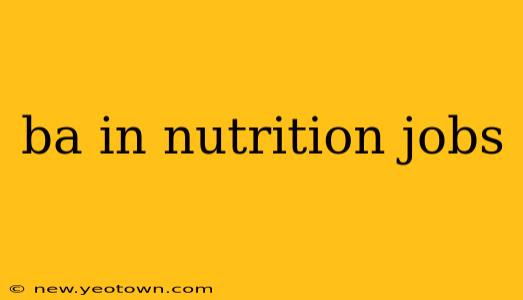So, you've earned your Bachelor of Arts (BA) in Nutrition – congratulations! Now, you're probably wondering, "What can I actually do with this degree?" The truth is, a BA in Nutrition opens doors to a surprisingly diverse range of exciting career paths. It's not just about lab coats and clinical settings; it's about impacting people's lives in countless ways. Let's explore the possibilities, tackling some common questions along the way.
What Jobs Can You Get with a BA in Nutrition?
This isn't a simple "one-size-fits-all" answer. The specific job you land will depend on your interests, further education, and networking efforts. However, a BA in Nutrition provides a solid foundation for several rewarding professions. Think of your degree as a versatile toolkit; it equips you with the knowledge to understand nutrition science, communicate effectively, and analyze data – skills valuable across many sectors.
We'll delve deeper into some specific roles shortly, but generally, you could find yourself in roles focused on:
- Public health and community nutrition: Educating populations about healthy eating and lifestyle choices.
- Corporate wellness: Designing and implementing nutrition programs for employees.
- Food industry: Working with food manufacturers or restaurants to develop healthier products.
- Research and academia: Contributing to nutrition research or teaching the next generation of nutritionists.
- Journalism and communications: Sharing accurate nutrition information with the public through various media channels.
What is the difference between a BS and BA in Nutrition?
This is a frequently asked question, and the answer often depends on the specific university's curriculum. Generally, a Bachelor of Science (BS) in Nutrition tends to be more science-focused, with a heavier emphasis on biochemistry, physiology, and research methodologies. A Bachelor of Arts (BA) in Nutrition often incorporates more social sciences, like sociology, psychology, and communication. This doesn't mean a BA is less rigorous; it simply means the curriculum approaches nutrition from a slightly different angle, emphasizing the social and behavioral aspects of food choices and dietary practices. The career paths aren't strictly exclusive; many roles are accessible with either degree.
Is a BA in Nutrition enough to become a registered dietitian?
No, a BA in Nutrition alone is typically not sufficient to become a Registered Dietitian (RD) or Registered Dietitian Nutritionist (RDN). These credentials require completion of an accredited program and a supervised practice experience, often at the master's level. However, a BA can be a great stepping stone towards further education leading to RD/RDN licensure. Many programs accept students with a BA as a prerequisite for their master's in nutrition programs.
What are the best jobs for a BA in nutrition?
The "best" job depends entirely on individual preferences. However, several paths offer excellent opportunities for those with a BA in Nutrition. Consider these examples:
- Health Educator: You could design and deliver educational programs promoting healthy eating habits in schools, community centers, or hospitals.
- Wellness Coach: Work one-on-one with clients, helping them set and achieve their nutrition goals.
- Nutrition Writer or Blogger: Share your expertise by writing informative and engaging content for websites, magazines, or blogs.
- Food Service Manager: Apply your knowledge of nutrition to create healthy and appealing menus in restaurants, schools, or hospitals.
- Market Research Analyst (Food Industry): Analyze consumer trends and dietary habits to help food companies develop successful products.
What is the job outlook for a BA in Nutrition?
The job outlook for nutrition professionals is generally positive, driven by growing public awareness of the link between diet and health. However, competition can be fierce, particularly for advanced positions. Pursuing further education, gaining practical experience through internships, and networking effectively can significantly improve your chances of securing a desirable role. Specializing in a niche area, like sports nutrition or pediatric nutrition, can also enhance your employability.
Your BA in Nutrition is a valuable asset. It's a launchpad to a fulfilling career, but remember to be proactive, network strategically, and continue learning to stay ahead in this dynamic field. The world needs your expertise to help people make informed choices about their food and well-being.

